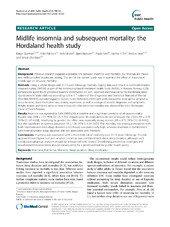Midlife insomnia and subsequent mortality: the Hordaland health study
Sivertsen, Børge; Pallesen, Ståle; Glozier, Nick; Bjorvatn, Bjørn; Salo, Paula; Tell, Grethe Seppola; Ursin, Reidun; Øverland, Simon
Peer reviewed, Journal article
Published version
Permanent lenke
https://hdl.handle.net/1956/8448Utgivelsesdato
2014-07-15Metadata
Vis full innførselSamlinger
Originalversjon
https://doi.org/10.1186/1471-2458-14-720Sammendrag
Background: Previous research suggests a possible link between insomnia and mortality, but findings are mixed and well-controlled studies are lacking. The aim of the current study was to examine the effect of insomnia in middle age on all-cause mortality. Methods: Using a cohort design with 13-15 years follow-up, mortality registry data were linked to health information obtained during 1997-99, as part of the community-based Hordaland Health Study (HUSK), in Western Norway. 6,236 participants aged 40–45 provided baseline information on self- reported insomnia using the Karolinska Sleep Questionnaire Scale (defined according to the 5th edition of the Diagnostic and Statistical Manual of Mental Disorders (DSM-V), sociodemographic factors, health behaviors, shift/night-work, obstructive sleep apnea symptoms, sleep duration, sleep medication use, anxiety, depression, as well as a range of somatic diagnoses and symptoms. Height, weight and blood pressure were measured. Information on mortality was obtained from the Norwegian Cause of Death Registry. Results: Insomnia was reported by 5.6% (349/6236) at baseline and a significant predictor of all-cause-mortality (hazard ratio [HR] = 2.74 [95% CI:1.75-4.30]). Adjusting for all confounders did not attenuate the effect (HR = 3.34 [95% CI:1.67-6.69]). Stratifying by gender, the effect was especially strong in men (HR = 4.72 [95% CI:2.48-9.03]); but also significant in women (adjusted HR = 1.96 [95% CI:1.04-3.67]). The mortality risk among participants with both insomnia and short sleep duration (<6.5 hours) was particularly high, whereas insomnia in combination with normal/greater sleep duration was not associated with mortality. Conclusions: Insomnia was associated with a three-fold risk of mortality over 13-15 years follow-up. The risk appeared even higher in males or when insomnia was combined with short sleep duration, although such unadjusted subgroup analyses should be interpreted with caution. Establishing prevention strategies and low-threshold interventions should consequently be a prioritized task for public health policy.
Utgiver
BioMed CentralTidsskrift
BMC Public HealthOpphavsrett
Copyright 2014 Sivertsen et al.; licensee BioMed Central Ltd.Børge Sivertsen et al.; licensee BioMed Central Ltd.

